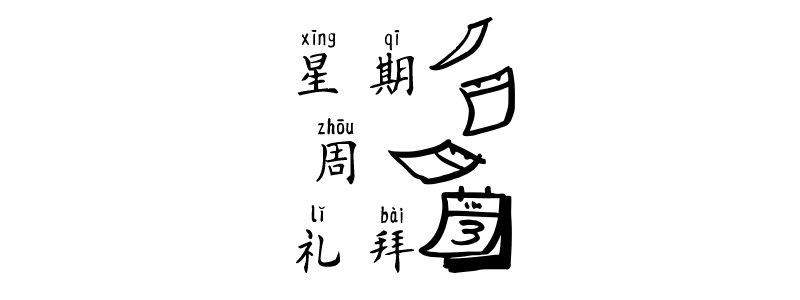Grammar Point:
In Chinese, “day” is translated as 日 rì or 天 tiān, and “week” is translated as 周 zhōu, 礼拜 lǐbài or 星期 xīngqī.
Structure
Number + 日 or 天
天 tiān is commonly translated as “day” or “a day.” 日 rì is less commonly used in everyday Chinese. It has a slightly more formal or poetic tone, and it is often seen in literature, historical contexts, or formal expressions.
兩天两天
Two days.
12日12日
12 days.
三天兩夜三天两夜
Three days and two nights.
這需要五個工作日这需要五个工作日
This will take five business days.
我們公司的貨提供7天鑑賞期我们公司的货提供7天鉴赏期
Our company provides a seven-day cooling-off period for our products.
FYI
The “seven-day cooling-off period” is a provision in Taiwan’s Consumer Protection Law. It allows consumers in certain types of transactions to request an unconditional return of the purchased goods within seven days. During this period, consumers can inspect the goods for completeness and any visible damages, but it is not intended as a trial period for actual use. The purpose is to give consumers the opportunity to examine the product before deciding whether to keep it. To be eligible for a full refund, the goods must be returned in their original, unused condition and with the packaging intact. It’s important to note that the seven-day period is specific to certain types of transactions and may not apply universally.
Number + 周, 禮拜/礼拜 or 星期
The terms 礼拜 lǐbài and 星期 xīngqī. require a measure word, while 周 zhōu does not.
If you want to know the difference between these three, please check the following article:
三個星期三个星期
Three weeks.
聖誕節我們要休息兩週圣诞节我们要休息两周
We will be on a two-week break for Christmas.
你們哪個禮拜有空?你们哪个礼拜有空?
Which week are you available?
一個星期有七天一个星期有七天
A week has seven days.
我每個禮拜都去教會我每个礼拜都去教会
I go to church every week.
上 or 下 + 周, 禮拜/礼拜 or 星期
上 shàng is used to indicate “previous” or “above,” and when combined with “week,” it refers to the week before the current one. And 下 xià is used to indicate “next” or “below,” and when combined with “week,” it refers to the week after the current one.
這週这周
This week.
下禮拜下礼拜
Next week.
上星期上星期
Last week.
下下週下下周
The week after next.
上上禮拜五上上礼拜五
The Friday before last.
Practice
TouchHover over the space to see the answers.
✔️ Next week, we only have to work for three days.
下禮拜只要工作3天下礼拜只要工作3天
✔️ I spent two weeks in China.
我在中國玩了2個星期我在中国玩了2个星期
✔️ Would you like to have dinner together next Friday?
你下下禮拜五要一起吃飯嗎?你下下礼拜五要一起吃饭吗?


